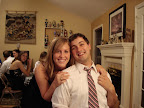* workin and blorking.
* still trying to find my rhythm up here.
* excited about thursday small group! Starts tomorrow. have no friggin clue how it will go.
What I'm readin:
* Still on the PNHotW.
* Am really ready to finish and start my books for next semester!
Random thoughts on my PVM:
Just listened to an interview with Phylis Tickle and Tony Jones. They said some neat stuff, but the thing that stuck with me was some terms that I really like. Orthonomy and Orthoparadoxy. I'll start with some background for you 'uninformed' theologians out there...
Orthodoxy::
Orthodoxy is the foundation upon which the church of history has stood upon. There is no heresy without the opposing orthodoxy. Orthodoxy is the standard by which lines are drawn in the sand; orthodoxy allows one believer to say to another, "you are wrong, and I am right."
I would argue that this idea has been essential in the formation of the faith. Without the idea of orthodoxy, Christianity might have been assimilated into any number of previous religions or philosophies. Without this idea or rightness, the early Christian might have floundered about, and the confidence and assurance of knowing G-d that made Christianity so appealing in a time of great change and uncertainty might have dissipated. The movement of G-d's kingdom among the earth might have slowed down or flickered out without the idea of orthodoxy... might have.
Orthonomy::
Orthonomy is an appealing idea, one that is perhaps best captured in the phrase attributed to Keats, "beauty is truth, truth beauty." Phylis Tickle speaks of a time when she was lecturing to some Presbyterians regarding the validity of the virgin birth - the issue is apparently hotly debated in some of these circles. The story goes that as she was speaking, a youth stopped what he was doing in another room, and slowly drew closer to the talk. When she was done, the youth approached her and asked her about the whole topic - why was she talking about it? After explaining herself and why it was important to discuss this historical event, the youth said, "I don't know... It just seems too beautiful to not be true."
When examining the scope of history, the movement of G-d through history, the stories of salvation, redemption and restoration, and the beauty of all that G-d has done, sometimes (perhaps often) my response is - It's just too damn beautiful for it to be false. There's no way I can simply dismiss it out of hand. Even with hard proof to the contrary, my soul would speak out otherwise.
Unfortunately, this idea is centered and anchored around the idea that beauty defines truth, and beauty, as they say, is in the eye of the beholder. This idea also does not resonate with me, as pure relativity is too open to distortion and perversion. In my limited perspective, I cannot imagine that all truth is relative...
Orthoparodoxy::
I love this. It captures to me, more than any other idea, the thought that G-d is other-than, beyond our comprehension. It is time, in my humble opinion, for us to return to the mystery of our faith. Reason has helped us along. However, reason cannot carry us to the throne. Only pressing into the mystery, the beauty, and the presence of a living G-d can be our path.
I will dwell on this thought and post more later...
